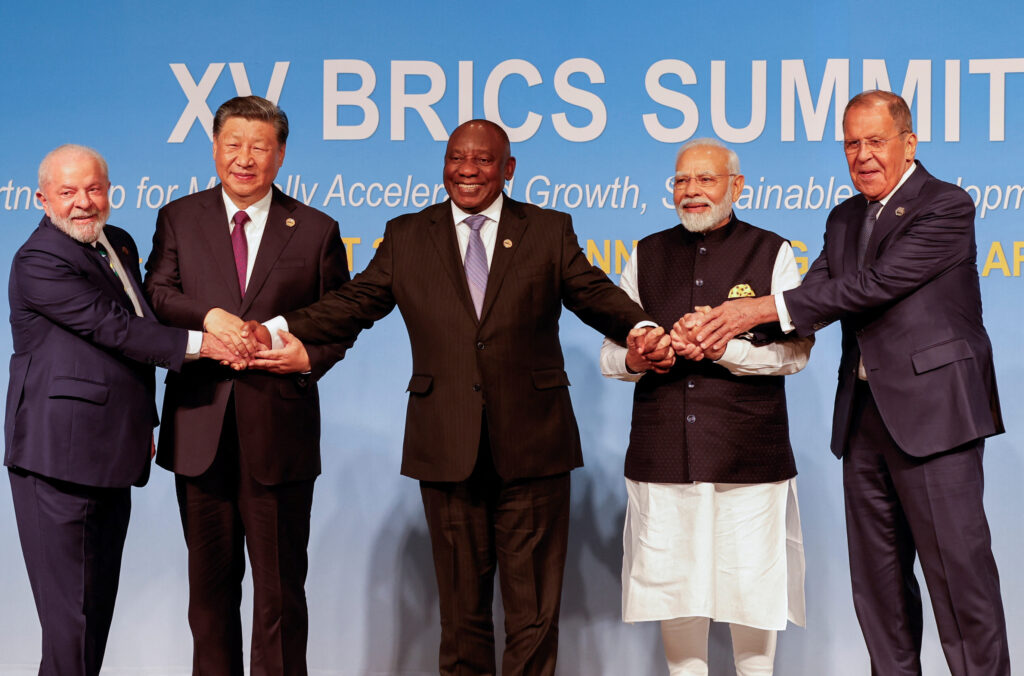BRICS+ can play an effective role in facilitating diverse engagement and work for the common interests of all members provided the ambition of one nation is not allowed to jeopardise the growth agenda of other nations.

- BRICS formally declared that Iran, Egypt, Saudi Arabia, Argentina, UAE and Ethiopia will become full members as the group changed its name from ‘BRICS’ to ‘BRICS+’.
- For Russia, it is an important test of how despite mounting sanctions against them, they are able to get international cooperation and their diplomatic efforts.
- India primarily views BRICS as a platform for nations that can benefit from digital innovations, and economic development and open doors for the Global South.
- Hence, India has to make sure that the BRICS won’t turn into a mere reactionary group to counter similar Western groups.
Until the BRICS summit did not announce the Johannesburg II Declaration, most observers felt that the summit had again amounted to nothing and remained inconclusive in its own expectations. People in the West have a habit of always declaring the progress of any project well before it even starts and there was no exception made here. Most of the news focused on the lack of a BRICS common currency and everyone seemed to think that this would be another meeting of powers with divisions within and cannot ever match to the levels of a G7 grouping. However on the last day, led by the South African head of state, BRICS formally declared that Iran, Egypt, Saudi Arabia, Argentina, UAE and Ethiopia will be invited to become full members which will take shape from 1st January 2024.
Effectively termed the ‘Johannesburg II Declaration’, the group changed its name from ‘BRICS’ to ‘BRICS+’, highlighting the accommodation of these nations in its title. The news caught most naysayers in surprise and it led to a multitude of reactions as predicted. While it is too soon to comment on whether it takes prominence against a G7 or other such multi-nation groups, BRICS has finally touched upon the expansion drive it essentially aimed for a long time. The sole objective for this grouping was to emerge as an alternative platform of G7 and primarily to balance out power-sharing with the West. It is no surprise to understand how deeply divisive some countries are inside BRICS but somehow the signs of progress are visible after 6 nations were invited on the 24th of August and their membership will be made official in 2024.
While there was excitement after this important agreement was formulated in the Johannesburg II Declaration, many questions were asked initially as to why it took time to make such an expansion after 40 countries had applied for some time. The focus went towards the inherent divisions of BRICS and the relationship between member states, especially China and India and the demands on the kind of approach towards BRICS. The understanding was that both China and India were trying to push and frame the grouping in their understanding and image. The only problem is that it brings up points of disagreement and confrontation.
For most of the most part, China was seen as trying to make an anti-West alliance and a direct opposition towards the G7 as well. The kind of articles about China facing opposition in terms of including new members was not new. In fact, it won’t be a matter of surprise that the Chinese have always been a dominant member of the grouping. There has been an understanding that the Chinese faced hurdles to use this grouping on its own terms, given how the Russians never really allowed them to lead without their watchful eye. While the Chinese have better ties today, it was not always the case and such kind of internal differences existed before and after. However, it seems highly unlikely that there will be any issues in the expansion of the group between Russia and China.
For Russia, it is an important test of how despite mounting sanctions against them, they are able to get international cooperation and their diplomatic efforts haven’t failed at all. If 40-plus nations have applied for membership of BRICS with other nations trying as well, it serves as a good reminder that not all favour the Western standards of what designates as a threat to global peace and cooperation. With the Russian economy also growing, this couldn’t have come at a better moment that one of their groups is gaining popularity and steam. Russia is largely unaffected by differences between India and China as long as it maintains itself from having exclusive relations with them and acts as a mediator at times.
This happens to be a special moment for South Africa since it is the ‘Johannesburg II Declaration’ that spoke about the expansion of BRICS. Being the new member itself when it joined in 2012, much was expected from them as well. South Africa has made good use of its participation here to get closer ties with both Russia and China. China in particular is one of its largest trading partners today. This also opens a door for the participation of African nations in the larger scheme of things which often late, they have pointed out their absence from it. What remains to be seen is whether the inclusion of the African nation-states leads to more diverse engagement of the Global South or is only limited to a few hand-picked countries that might enjoy the spoils of a good nation’s ambition. But regardless of that scrutiny, BRICS + does show a promise of a wider engagement with multiple nations.
Brazil, under Lula, has tried to balance between the West led by the US and the Russian Federation. Often, Lula has offered to be the mediator between these two nations ever since the Ukrainian crisis began. Latin America itself has no less trouble with nerves being constantly tested around Argentina’s huge inflation, Peru’s democratic institutions being labelled as corrupt, Ecuador’s political figures being targeted by the criminal organization involved in drug trafficking and a new constitution being introduced in Chile. Even Caribbean states have much of an influence in these areas with Nicaragua’s recent political changes that have been a cause of curious study for many. But a country like Brazil offers these nations an example to try and follow a simple route of recognition that ensures a higher level of participation of Latin American nations but gets them a platform to engage and have bilateral relationships that widen their diplomatic engagement. India for example has focused itself on increasing its engagement with Latin American countries, especially after the recent decision taken by Brazil to not fall under pressure from the West to arm Ukraine in any way whatsoever.
And finally, India. Many news portals as well as China experts accused India of blocking the expansion of BRICS as they highlighted the differences among the two nations. India itself had to clarify on a number of occasions that their position was never to go against the expansion of BRICS but to not let it turn into a group led by the interests of one nation’s ambitions. If India denied the blocking of this expansion, it also made sure that just like the QUAD, the BRICS wouldn’t turn into a reactionary group only to counter Western groups. The idea was never to hamper any nation in particular but to keep the group above needless geopolitical rivalry.
India primarily views BRICS as a platform for nations that can benefit from digital innovations, and economic development and open doors for a global South that has been waiting for its embrace of international affairs. It doesn’t mean that India has an excellent bilateral relationship with China but it chooses to engage regardless of its monumental differences. That happens to be as good as any example of productive engagement as it goes. Since China is close to many members of the Global South, it makes sense for India to occupy the space of a potential choice viewed separately from the Chinese. It boosts their space and helps nations make informed choices.
The inclusion of the UAE as well as Saudi Arabia are viewed as favorable to India although Russia too has recently moved in a positive direction with them. The Ethiopian inclusion is most likely China-centric but even South Africa understands its importance in terms of including African nations on the global stage. Egypt and Iran are two such nations that seem to have the minimum amount of differences and have complete acceptance from all BRICS nations. Argentina also seems to be accepted by all but it remains to be seen how their internal situation with the economic inflation changes after this expansion.
The last but most important point for people to understand is that it is the ability of individual governments that can drive BRICS+ forward to its own expectations and objectives it plans to set in the world. Lula is an example of how Brazil changed their engagement in a positive manner after the kind of approach taken by his predecessor came under fire. Any organization’s success must match the personal motivation of the leaders who are involved in the decision-making affairs of the organization. BRICS+ can play an effective role in facilitating diverse engagement and work for the common interests of all members provided the ambition of one nation is not allowed to jeopardise the growth agenda of other nations.
(Anhad Jakhmola is a postgraduate scholar in international relations. He has his undergraduate degree in history and is pursuing his Ph.D. in Defence and Strategic Studies. He is a columnist for many portals and is a keen public speaker in debates and discussions. Views expressed are author’s own)

